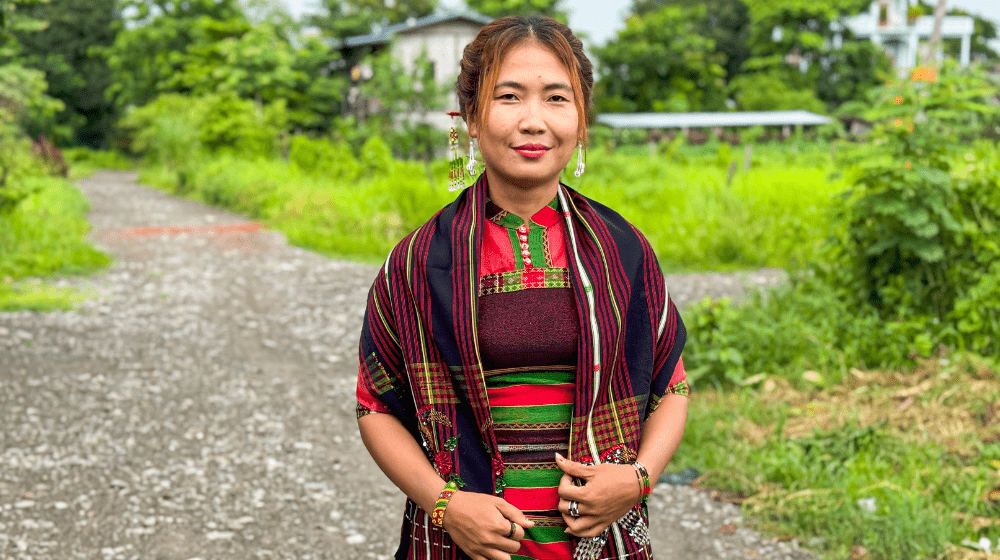"The most significant challenge confronting women and girls with disabilities stems not from their impairments but from the deeply rooted discrimination in their communities,” Monica asserts. Her messages represent the voices of persons with disabilities in the communities. Monica was born in Tedim, Chin State. Her life took an unforeseen turn at the age of two when a routine medical injection resulted in severe complications, introducing her to a life of physical challenges. From an early age, Monica faced not only the physical barriers constructed by the community not designed for disabled persons but also the immense societal obstacles and discrimination.
As Monica grew up, each day presented its own set of hardships. "School stairs felt like insurmountable walls, and being excluded from physical activities with my classmates deepened my sense of isolation," she remembers. Monica's parents supported her through challenges, instilling a deep belief in her own values and abilities. She says, "My dad always believed in me, reminding me that I have the strength to overcome those challenges and shape my life better." This belief helped her navigate the discrimination and cultural stigmas that often stifle the spirits of many girls in her situation.
Her academic journey became a symbol of her resilience. Monica excelled in her studies, graduating from high school with distinctions, and later earned her university degree. This academic excellence was a testament to her unbreakable determination to forge a path for herself, breaking many social stereotypes about people with disabilities.

Equipped with those qualifications, Monica aspired to become a teacher with the hope of making a change by educating young minds. However, her path was thwarted by repeated rejections due to her disability. "It was the painful, constant rejection that made me question the inclusivity of our society," Monica reflects. The turning point came when she realized that her true calling might not lie in a traditional classroom. "I can make a change in the community for those in need, regardless of my physical disabilities," she asserted, her resolve turning her towards a new direction.
Monica joined the Disability Development Initiative (DDI), a Disabled People's Organization, where she discovered her true passion for advocacy and empowerment. She dedicated herself to empowering disabled women and girls by undertaking various activities, including educating the community on sexual and reproductive health and rights, promoting gender equality, and preventing gender-based violence.

"Every night, I reflect on what I've done today for the community and for persons with disabilities. It drives me to strive for better outcomes tomorrow," Monica shares.
The initiatives backed by Monica have had profound impacts, providing the people with the strength and confidence to call for their rights. "Empowering persons with disabilities to become independent and self-sufficient is crucial. It is not only for their dignity but also for sustainable development," she emphasizes. Monica’s advocacy and support go beyond immediate needs, focusing on systemic changes that can provide long-term solutions.

"Monica has been a pillar of strength for our community," praised a local community member. "She's not only a champion for the rights of disabled people but also an advocate for all of us. Her dedication reminds us of the power of inclusion and equality."
A community member who is disabled and a beneficiary of the vocational training program shares, "I attended one of the vocational trainings Monica organized, and it changed my life. She taught us that our abilities are stronger than our disabilities. Thanks to her encouragement and guidance, I'm now running my own small business selling those handmade Chin traditional necklaces."
Her colleagues describe her as a powerhouse of positivity and innovation. "Monica doesn't just work for change; she embodies it. She has gained the trust of women and girls in the community. Her sense of humor makes the community participants at the training learn the knowledge easily and forget their stress and pain. They admire her," says Myint Thu, one of her coworkers. "She remarkably shows us her strong commitment and dedicated effort in empowering women and girls with disabilities for equal rights and advocating equal job opportunities in our community."

In collaboration with UNFPA, DDI has been able to extend its reach, establishing essential support and services such as the Women and Girls Centre and Safe House for women and girls, including persons with disabilities and internally displaced people from affected communities in Chin and Sagaing. These centres serve as beacons of hope and protection, providing essential support to those women and girls in need.

"Thanks to UNFPA’s continuous support, we’ve been able to make significant strides in disability inclusion and support within our country," Monica notes gratefully. Yet, she remains steadfast in her belief that more needs to be done. "The disability inclusion journey is far from over. We continue to need the support of international and local organizations and the private sector."
Monica's vision is resolute and potent: "I fight for a world where every woman and girl, regardless of her abilities, has the right to dream, achieve, and thrive." Her call to action is not just for those with disabilities, but for all who believe in a more inclusive and equitable world.

UNFPA is committed to ensuring that persons with disabilities play a central role in creating a more inclusive World and advocating for equal rights and freedom from violence. The UNFPA Disability Inclusion Strategy prioritizes the inclusion of people with disabilities in all of UNFPA's activities. By focusing on the rights of people with disabilities, UNFPA contributes to the achievement of the Sustainable Development Goals, particularly the principle of "leaving no one behind" (LNOB). Disability inclusion is important because it contributes to all of UNFPA's transformative results by ensuring sexual and reproductive health and rights for everyone.


